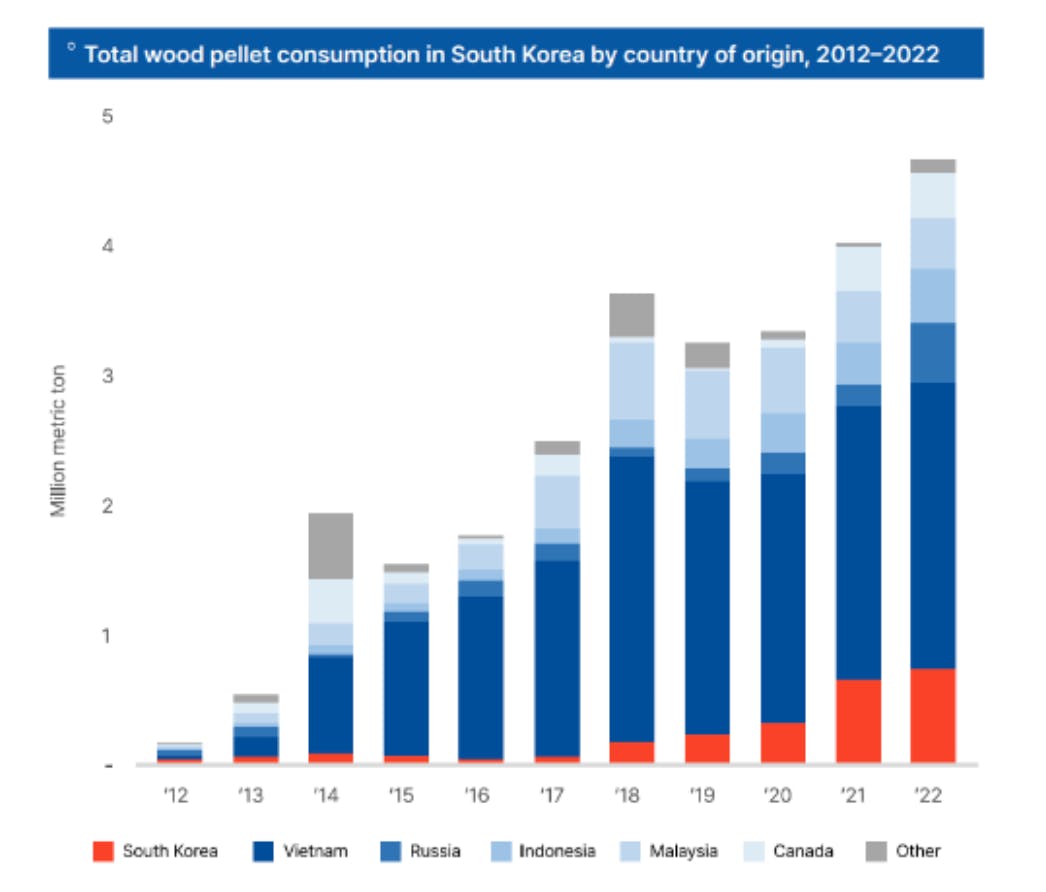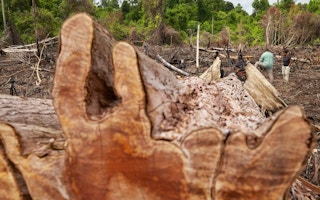A group of more than 60 non-governmental organisations from around the world has appealed to the South Korean government to stop issuing renewable energy certificates (RECs) for biomass power.
South Korea’s trade ministry is currently revising the weightings for different types of energy traded for RECs – certificates that verify the purchase of renewable energy – and a collective of NGOs has called on the ministry to remove biomass as a procurement option for companies buying RECs.
Biomass is generated from burning wood from forest plantations, mainly cultivated in Southeast Asia, and has been hailed by proponents as a renewable alternative to coal to meet rising energy demand in the region.
In an open letter, environmentalists from 61 local and international NGOs decried biomass as a “false solution” to climate change, because new trees grown to replace felled ones can take many decades to absorb the carbon released when trees – in the form of wood pellets – are burnt.
Burning trees for energy emits more carbon dioxide per unit of energy produced than coal, oil, and gas and woody biomass plantations often replace forest ecosystems that are crucial for sequestering carbon, the group said in the letter, which was sent to Korea’s Ministry of Trade and Industry (MOTIE) last Friday.
The government has yet to respond directly to the NGOs’ letter, but told a Korean newspaper that it would “comprehensively review” findings from the Korea Energy Economics Institute, which it commissioned to assess the various energy sources used to trade RECs in Korea.
Vietnam is by far South Korea’s biggest supplier of wood pellets, while Indonesia and Malaysia are also key producers. According to recent reports, Korean imports are placing pressure on Vietnam’s native forests, found to have been cleared to fuel global demand for “clean energy”.
The letter criticises South Korea for exploiting an accounting loophole in Intergovermental Panel on Climate Change (IPCC) rules that allows consumer countries to omit emissions from burning biomass in their carbon footprint calculations. The ambiguity has encouraged Korea to ramp up biomass use while outsourcing its own “carbon burden” to producing countries such as Vietnam, the group said.

Vietnam accounts for most of Korea’s wood pellet consumption. In 2021, Vietnam’s exports to South Korea accounted for 60 per cent of its total production [click to enlarge]. Image: Subsidised Deforestation: 10 Years of Biomass Power in South Korea
South Korea’s consumption of biomass power has increased 42-fold since 2012 (see table).
Korean imports of wood pellets from Russia have increased eight-fold since the invasion of Ukraine, making South Korea a major enabler of the ongoing war, the NGOs added.
The group noted that biomass, which is currently Korea’s second largest source of renewable electricity after solar, is given preferential weightings when calculating the value of RECs that crowds out other renewables sources, including solar and wind.
Since 2015, South Korea’s biomass sector has received US$3.7 billion worth of RECs from the burning of 50 million tonnes of wood, which the NGOs calculate has resulted in cumulative emissions of over 70 metric tonnes of carbon dioxide.
The activist groups urged the Korean government to remove “market-distorting” subsidies on biomass RECs they said have “hindered the expansion of renewable energy” in the fossil fuel-dependent country.
NGOs that signed the letter include South Korea’s Solutions for Our Climate, Auriga Nusantara of Indonesia, Malaysia’s Sahabat Alam Malaysia, Greenpeace East Asia and Friends of the Earth Japan as well as groups from the United States, Canada, Europe, Australia and Russia.
They described biomass as a “dangerous distraction” to Korea’s ambition to boost renewable energy capacity – the country signed a pledge to triple renewables by 2030 at the COP28 climate talks in December last year – and speed up the decarbonisation of the world’s seventh largest national emitter.
South Korea is aiming to increase the share of renewables in its energy mix from 9 per cent in 2022 – the lowest among major economies – to 20 per cent by 2030, a target that has been criticised for being unambitious.
Its national climate action plan has been labelled “highly insufficient” by Climate Action Tracker, a non-profit, and “not at all consistent” with the Paris Agreement’s 1.5°C temperature limit.

















